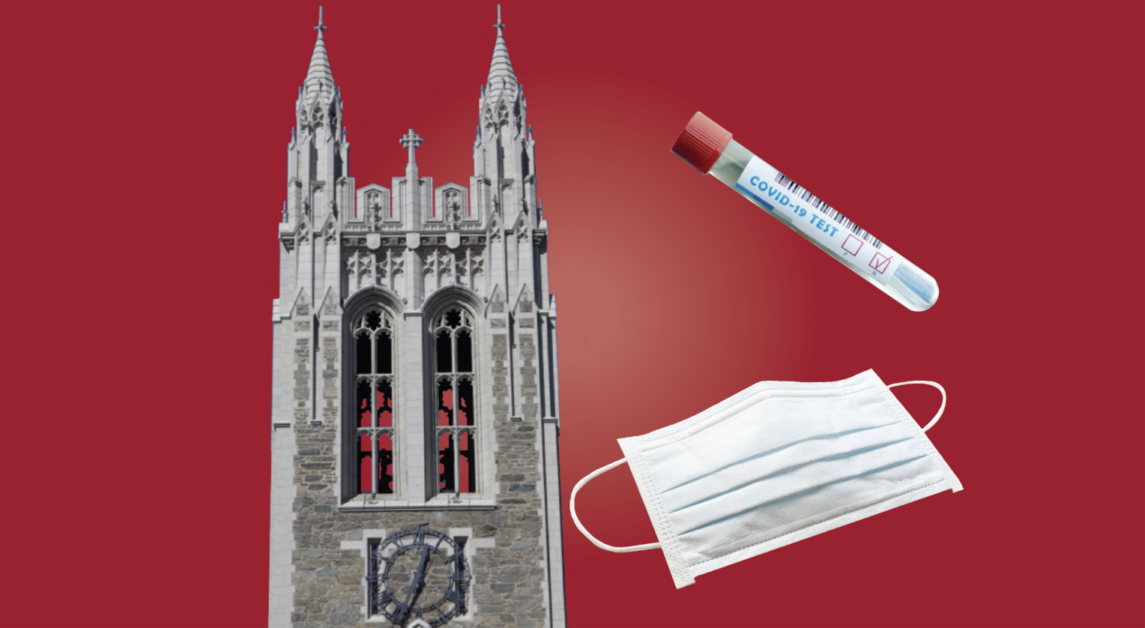“With the aggressive spread of the Omicron variant across the country and globe, the University will require that all students obtain a COVID-19 PCR test within 72 hours prior to their return to Boston College this month,” the email reads.
Dozens of U.S. colleges are moving online for the beginning of the spring semester in light of surging COVID-19 cases, The Boston Globe said. BC will remain in person for the spring, as will Northeastern University and Harvard University, according to Boston Business Journal.
The email, which was sent by Director of University Health Services Douglas Comeau and Vice President of Human Resources David Trainor, states that students who cannot obtain a PCR test can submit an antigen test within 24 hours of their arrival to campus.
Students who test positive for COVID-19, from either a PCR or antigen test, must inform University Health Services and should not travel or return to campus until they are done isolating, according to the email.
COVID-19 tests are currently in high demand amid a surge of the Omicron variant, according to the Globe, with Massachusetts facing a shortage of rapid tests and long lines for testing clinics.
Citing BC students’ upcoming travel and the transmissibility of the Omicron variant, the University will also instill a temporary mask mandate on campus “whenever physical distancing cannot be maintained.”
“This masking period will be from Friday, January 14, corresponding with the return of students, through Monday, January 31, 2022,” the email reads.
Other Boston universities—including Boston University and Harvard—implemented indoor mask mandates for the fall semester and will continue them for the spring semester.
In accordance with recommendations from the Centers for Disease Control, all students who test positive for COVID-19, regardless of vaccination status or symptoms, will be required to isolate for at least five days. If they have decreasing symptoms and no fever after the fifth day, students can leave isolation.
Students who still have a fever after the fifth day will remain in isolation until the fever resolves. These recommendations have also been adopted by the Massachusetts Department of Public Health, according to the email.
Students who are identified as close contacts of someone who tested positive for COVID-19 will not have to quarantine if they have been fully vaccinated, have received a booster, and have no symptoms, but they still must receive two negative COVID-19 tests following exposure. Students who have not received a booster will have to quarantine for five days and receive two negative tests.
Students who are contact traced will also have to wear masks when unable to maintain physical distancing following exposure. Students who don’t have to quarantine will wear masks for 10 days, and students who have to quarantine will wear masks for five days following release from isolation.
The email reiterated that students must upload their vaccination card after receiving a COVID-19 booster by Feb. 9, per BC’s previously issued booster mandate, unless granted an exemption. For those yet to receive a booster shot, the University will offer vaccination booster clinics on campus between Jan. 10 and 17.
In addition to being tested before the return to campus, the email also reminded students that COVID-19 testing will occur during move-in dates between Jan. 15 and 17. Students who live off campus should be tested preferably between Jan. 10 and 14, according to the email.
“We are all learning to live with COVID-19, and the University will remain vigilant and flexible in its approach,” the email reads. “Thank you for your continued cooperation in helping to safeguard our campus and surrounding communities.”
Featured Graphic by Annie Corrigan / Heights Editor



















